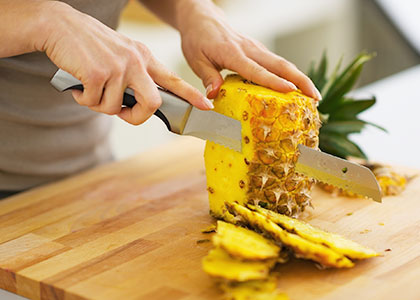
9 Powerful Health Benefits of Pineapple
By Claire Georgiou, Reboot Naturopath, B.HSc ND
Pineapples are my all-time favorite fruit to juice! Depending on the time of year, sometimes they are sweet and sometimes they add a sour kick, but every time they offer a perfect flavor. One look at a pineapple might make you want to take a vacation to the tropics, it’s also loaded with wonderful health properties mainly due to its high levels of bromelain. So let’s take a look at why this beachy fruit is more than just an ingredient in your go-to frozen drink.
1. Pineapples help fight away colds.
How fascinating is this? Researchers found that the raw extract from pineapple had the ability to decrease mucus five times faster than over-the-counter cough syrup and also helps patients recover 4.8 times faster. Bromelain is the compound that could be responsible for helping to reduce your cough. Here is a great natural pineapple cough juice you can make in the comfort of your own home. To reduce the severity and duration of a cough, consume this juice in 5 oz (150 ml) servings 3 x daily until it has resolved.
2. Pineapples are packed full of nutrients.
Pineapples are loaded with vitamins and minerals including vitamin A, vitamin C, manganese, calcium, phosphorus, potassium and fibre. One cup of pineapple pieces contains 131% of the daily-recommended value of vitamin C and approximately 7-9% of your daily B1, B6 and folate requirements.
3. Pineapples can reduce pain and inflammation from Arthritis.
Eating pineapples is believed to greatly alleviate the pain of arthritis. A study compared a that a combination of bromelain, trypsin, and rutin was compared to diclofenac in 103 patients with osteoarthritis of the knee and it concluded that after 6 weeks, both treatments resulted in significant and similar reduction in the pain and inflammation. Other studies demonstrate the effectiveness of bromelain in reducing inflammation and pain experienced.
4. Pineapples help improve digestion of proteins and reduce unhealthy bacteria.
The bromelain in pineapple is believed to help break down protein to help support digestion. Bromelains also appear to counteract against some pathogens in the digestive tract which may help reduce diarrhea. Other studies indicate that bromelain may stop the adhesion of some pathogens inside the intestinal lining.
5. Pineapples can help an ‘owie.’
Both fresh pineapple juice and bromelain have been shown to aid wound healing in studies, it has shown to accelerate recovery and reduce inflammation.
6. Pineapples are super anti-inflammatory.
Bromelain can be included to reduce many type of inflammatory health conditions. Bromelain accounts for many therapeutic benefits like the treatment of angina pectoris, bronchitis, sinusitis, surgical trauma, and thrombophlebitis, debridement of wounds, and enhanced absorption of drugs, particularly antibiotics. Want more anti-inflammatory juices? Check out our 25 Anti-Inflammatory Juices digital download (it includes tons of information on how to live an anti-inflammatory life too).
7. Pineapples lower risk of macular degeneration and cataracts.
Including pineapple and other fruits regularly can lower risk of macular degeneration by as much as 36%. Pineapple contains vitamin C and beta-carotene which are good for eye health and help to prevent cellular damage. A study concluded that vitamin C has a protective effect against cataract development.
8. Pineapples help your bones stay strong.
Pineapples may help maintain strong healthy bones! One cup of pineapple contains approximately 76% of the daily-recommended value of the mineral manganese, which is essential in developing strong bones and connective tissue. A study suggested that manganese, along with other minerals, may be helpful in preventing osteoporosis in postmenopausal women.
9. Pineapples contain anti-cancer properties.
A study in 2013 in Sydney showed that bromelain has the potential to act as an effective cancer-fighting agent, particularly in combination with chemotherapy to suppress the growth of cancer cells.
Bottom line: Eat, juice and blend those pineapples!
Here are some awesome pineapple recipes to enjoy:
- Homemade Turmeric Pineapple Gummies
- Turmeric Pineapple Popsicles
- Quick Quencher Pineapple Juice
- Green Citrus Pineapple Punch
- Sunny Pineapple Juice
- Joe’s Favorite Juice: Watermelon Pineapple Ginger
- Lean Green Pineapple Juice
- Pineapple Power
- Green Pineapple Smoothie